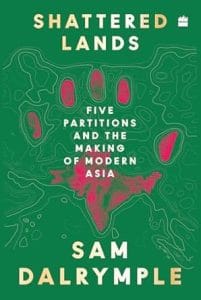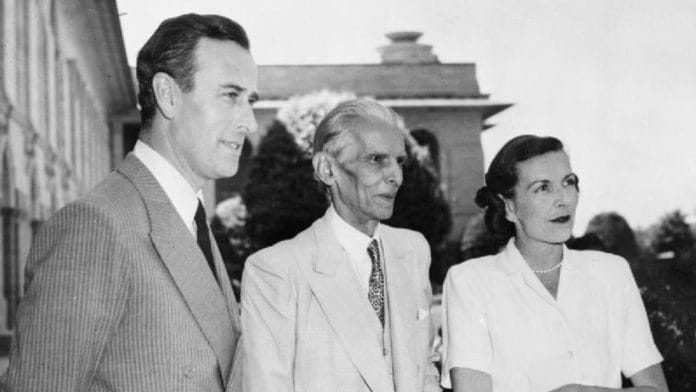Mountbatten was aware of Nehru’s influence over Britain’s Labour government and he placed extra importance on this relationship, seeking out the Congressman the very same day as his audience with Bikaner and Bhopal. ‘In Mountbatten’s view Nehru was extremely frank and fair,’ recorded Campbell-Johnson. At the end of the interview, as Nehru was about to take his leave, Mountbatten said to him, ‘Mr Nehru, I want you to regard me not as the last Viceroy winding up the British Raj, but as the first to lead the way to the new India.’
Nehru turned, looked intensely moved, smiled and then said, ‘Now I know what they mean when they speak of your charm being so dangerous.’ The Mountbattens saw a lot of Nehru in the coming days, and they soon picked up their close relationship from where they had left it in Singapore. Edwina grew particularly close to him, and when the Mountbattens held a garden party for the delegates of the Asian Relations Conference, Nehru was photographed sitting cross-legged by her feet. That evening ‘Edwina accompanied Jawahar back to his house on York Road for a night cap – with her daughter, but without her husband.’ Ten days after the Mountbattens’ arrival, Shahid Hamid noted that ‘Nehru’s relationship with Lady Mountbatten is sufficiently close to have raised many eyebrows.’ The Mountbattens’ relationship with other political leaders would not be so smooth.
When Edwina invited Aruna Asaf Ali into Viceroy’s House, the legendary hero of the Quit India movement came out dejected. ‘It’s a transfer of power,’ she spat. ‘Not a revolutionary transformation at all.’ Meanwhile, when Gandhi was invited for high tea, he ‘did not touch either the cakes or the sandwiches, but chose to eat a bowl of goat’s curd which he had brought with him’. In the course of the meeting, Gandhi suggested India’s unity might be saved if Jinnah were made prime minister of India and India’s cabinet was made exclusively Muslim.
Also read:
Mountbatten, taken slightly aback, politely told the Mahatma he would think about it, knowing full well that he wouldn’t. The other important relationship established in that first week was between the Mountbattens and the gruff home minister Sardar Patel who would control the Viceroy’s access to secret intelligence throughout his tenure. Mountbatten had been ‘somewhat apprehensive’ about meeting Patel, and both he and Edwina were rather shocked when Patel suggested using the army to ‘get rid of the Moslem League’. In the event, the encounter went better than expected and Mountbatten ‘detected a twinkle in Sardar’s eye’. But soon afterwards Patel revealed his political edge by sacking the head of India’s Intelligence Bureau, replacing him with a Congressman and forbidding Mountbatten from meeting him.
The fact that a Congressman had controlled the intelligence services months before independence would be kept secret for years afterwards, and the official Transfer of Power documents would falsely claim that its previous director Norman Smith had continued to serve in his role until independence. The embarrassing truth, however, is that the entire Partition of 1947 took place when Patel, rather than his British superiors, controlled the intelligence services.
Edwina later told Isobel Cripps that: Both Dickie and I like Vallabhbhai Patel very much indeed, although we quite realise the dominant attitude he adopts and his rather dictatorial manner. He and Dickie, however, are getting on very well indeed and when he behaves like a bit of a gangster, Dickie, as you well imagine, does not lag behind.
Although Mountbatten’s relationship with Patel would be rocky, he had reserved his most difficult meeting for last. On 5 April, two whole weeks after his arrival in Delhi, Mountbatten finally met Jinnah. The leader of the Muslim League proved ‘formal and reserved’, and began his conversation by giving the Viceroy a list of demands. But Mountbatten shot him down at once, saying, ‘Mr Jinnah, I am not prepared to discuss conditions or, indeed the present situation until I have had the chance of making your acquaintance and knowing more about yourself.’ Jinnah was ‘completely taken aback’ and ‘for some while did not respond, remaining reserved, haughty and aloof. But in the end his mood softened and he duly succumbed to Mountbatten’s desire to hear him recount the story of the Moslem League’s rise to power in terms of his own career.’
Later Mountbatten suggested that if India was to be divided, then so should religiously mixed provinces like Punjab and Bengal. The suggestion horrified Jinnah. ‘Pakistan without Calcutta,’ he had long maintained, ‘would be like asking a man to live without his heart.’ The two men left the meeting with a bitter taste in their mouths. When Jinnah was gone, Mountbatten turned to Campbell-Johnson and said, ‘My God, he was cold. It took most of the interview to unfreeze him.’
It was the start of a difficult relationship that even Edwina couldn’t crack. After a ‘frigid afternoon tea’ with Jinnah’s sister Fatima, Edwina described her as ‘almost fanatical at times in her attitude’. In a letter to Isobel Cripps she admitted that both she and Dickie had found the Jinnahs ‘most difficult’, even though they sympathised ‘so much with their fears and apprehensions’. The warm relationship established with Nehru, the tense but functional relationships with Gandhi and Patel, and the actively hostile relationship with Jinnah foreshadowed just how different the new Viceroy would be from his predecessors. Whereas Linlithgow had been partisan towards the Muslim League and Wavell had straddled some sort of middle ground, it soon emerged that Mountbatten’s Viceroyalty would be decidedly pro-Congress.
 This excerpt from Sam Dalrymple’s ‘Shattered Lands: Five Partitions and the Making of Modern Asia’ has been published with permission from HarperCollins India.
This excerpt from Sam Dalrymple’s ‘Shattered Lands: Five Partitions and the Making of Modern Asia’ has been published with permission from HarperCollins India.






